| Srl | Item |
| 1 |
ID:
161577
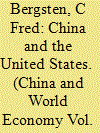

|
|
|
|
|
| Summary/Abstract |
This paper considers whether there is a “Thucydides trap” in the world economy, referring to the inherent conflict between incumbent and challenger. It assesses the impact of President Trump's alienation of traditional US allies, which threatens to splinter the “hegemonic coalition” and even push China and Europe together, and his convergence toward some Chinese norms on trade and even politics. It outlines three possible systemic scenarios: a “G0” in which the US is no longer willing to lead but China is not yet able or willing, and whether such a (likely) regime will be stable or unstable; a new “G1,” sooner or later, led by China; and a cooperative “G2” in which the US and China agree to share leadership. It traces the evolution of actual leadership initiatives of the two countries in recent years. It compares US and Chinese attitudes on key systemic issues and concludes with an appraisal of “an international economic order with Chinese characteristics,” a world in which the state plays a greater role relative to market economics, the rule of law defers increasingly to voluntary arrangements, and politics tilt toward central government control more than democracy.
|
|
|
|
|
|
|
|
|
|
|
|
|
|
|
|
| 2 |
ID:
146484
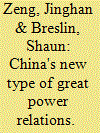

|
|
|
|
|
| Contents |
The rise of China has been reshaping how the country sees its own role in the world. China has become increasingly willing to move from being a norm and system taker to a norm and system shaper (if not yet maker). One example is Xi Jinping's promotion of ‘a new type of Great Power relations’ designed to create a strategic space in which to operate. By using a mixed quantitative/qualitative analysis, we analyse 141 Chinese articles titled with ‘new type of Great Power relations’. We find that although Chinese analysts and policy makers rejected the idea of a G2 in 2009, the mainstream discourse has rapidly shifted to what we call a ‘G2 with Chinese characteristics’ which indicates a fundamental shift in Chinese evaluation of the power status of itself and others. While some Chinese scholars consider China to have already achieved the status as the world's No. 2 or even a superpower, the mainstream discourse views China as both a Great Power and a rising power at the same time. This, we argue, moderates the expectations of what China can and should do to resolve global problems despite its great power status.
|
|
|
|
|
|
|
|
|
|
|
|
|
|
|
|
| 3 |
ID:
105501
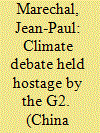

|
|
|
| 4 |
ID:
100590
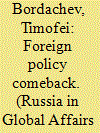

|
|
|
| 5 |
ID:
157886
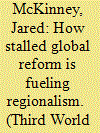

|
|
|
|
|
| Summary/Abstract |
In the Chinese view, the architecture of contemporary global governance – especially that of the Bretton Woods institutions – is flawed and in need of reform. Developing nations (like China), the argument runs, need to be given a role proportionate to their global economic influence. Since the Group of Twenty (G20) became a leaders’ summit in 2008, China has used the forum to push for such reform. But today, despite some supposed progress, reform has stalled. Recognising this fact, China is increasingly emphasising regional integration in its strategy for overcoming the middle-income trap. Global reform has not been abandoned, but – given its infeasibility – is no longer a short-term priority.
|
|
|
|
|
|
|
|
|
|
|
|
|
|
|
|
| 6 |
ID:
122135
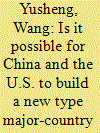

|
|
|
|
|
| Publication |
2013.
|
| Summary/Abstract |
The principal aspect of the contradiction in building a new type of major-country relationship between China and the U.S. is on the U.S. side. The "ball" is in the US court. So long as the U.S. can make efforts in the same direction as China does, there is hope. Otherwise, the same situation "you are either with us or against us" will remain. Twists and turns or even tension might emerge in Sino-U.S. relationship from time to time.
|
|
|
|
|
|
|
|
|
|
|
|
|
|
|
|